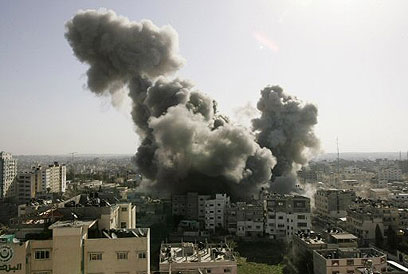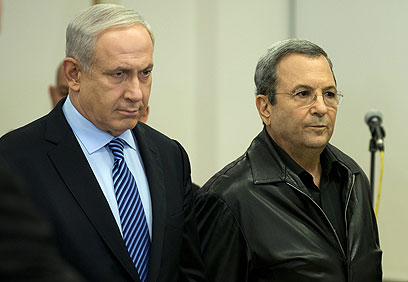
Israel addicted to war
Op-ed: Israeli wars, military operations based on flawed belief that force can solve problems
The research on the moral justification of wars focuses on two fundamental dilemmas: The justification of war (Jus in Bello) and the justification of the manner of using force during wars (Jus ad Bellum). The former dilemma focuses on the question of which situations justify war initiation by states. The second dilemma focuses on the moral constraints on the use of force during war.
The just war doctrine posits several criteria for the moral use of force. These include just cause—the prevention of major harm to the initiator; right intention—war should be fought only for the prevention of harm or correcting a wrong suffered by the initiator, not for material gain or revenge; competent authority—the decision to go to war is made by a legitimate political authority and after due deliberation; and last resort - war initiation takes place only after all other alternatives were exhausted without success. These principles suggest that the major criterion for war initiation is self-defense. This is also the only type of war that is admissible according to paragraph 51 of the UN Charter.
The justice in war doctrine also suggests several key criteria for the manner in which force should be used during wartime. These include the principles of distinction - force should be used against combatants, not against civilians; proportionality - civilian casualties must be substantially lower than the military advantage obtained by a certain operation, and military necessity - the use of force should be strictly instrumental and directly connected to the goal of winning or terminating the war.
According to these principles, a significant number of wars fought since the ratification of the First Geneva Convention in 1864 did not pass the moral bar of war initiation or war management. The Israeli case captures a solid middle position in this respect. Only three of the seven wars in which Israel was involved can be said to pass the moral test: the War of Independence (1948), the Six Day War (1967), and the Yom Kippur War (1973). In the other wars - the Sinai War (1956), the War of Attrition (1969-70); and the two Lebanon wars (1982 and 2006) - Israel violated either the just war principles or the justice in war principles, or both sets of principles. It is not a coincidence that Israel did not prevail in three of these wars.
Another important, but relatively neglected phenomenon in the study of war is the fightaholism or addiction to violence syndrome. There is ample evidence suggesting that the resort to massive force is not distributed randomly in the international system. A small share (about 13%) of all states that existed in the international system in the past 196 years is responsible for 90% of all wars since 1816. The same states have chosen time and again to deploy massive force as a means of settling their international problems. Moreover, 228 pairs of states (dyads like Israel-Syria or Israel-Egypt) that account for about one half of 1% of all possible dyads accounted for all of the warring dyads (for example, the Yom Kippur War includes three warring dyads—Egypt-Israel, Syria-Israel, Iraq-Israel.)

'Permanent' fightaholics. US soldier in Vietnam (Photo: Gettyimages)
Likewise, about 4.5% of all dyads that are considered politically relevant (contiguous states or dyads made up of at least one major power with the capacity of long-range deployment of military forces) accounted for all wars between politically relevant dyads. Almost identical statistics apply to militarized disputes short of all-out wars. Finally, it turns out that states that are addicted to violence are as likely to initiate conflicts as they are to be the targets of such conflicts. The story of fightaholism is not a story of victims that are drawn into violent conflagrations because they are targets of other states' violent actions.
States that are addicted to violence can be divided roughly into three groups: First, "old and permanent" fightaholics: These are states whose international history is saturated by violence throughout. Major powers like Britain, France, the United States, or Russia, or minor powers like Turkey and Greece are cases in point. The second group consists of "old but recovered" fightaholics. This group consists of states, such as Germany, Japan, or Italy, who had a fair share of their history that displayed addictive behavior, but at some point these states were "cured."

Economic strangulation. Attack on Pearl Harbor (Photo: AFP)
The third group consists of "young" fightaholics: States with a relatively short history, but one that is saturated by violence. Here we have states like Israel, Egypt, Syria, Iraq, India, or Pakistan. If we divide the number of conflicts in which a state has participated by the number of years it was independent, Israel goes to the top of the fightaholics list with an average of one war every eight years.
These statistics have fundamental implications in terms of the moral justification of war. Consider a residential neighborhood that is considered to have high rates of violent crimes. There are many families in this neighborhood, but only a few of them are engaged in violence, typically against other residents who are also prone to violence. The violent crime marking of this neighborhood is due to only a small minority of its residents.
This raises a new type of dilemma of morality: Justice across wars (Jus Trans Bella), that is, states that resort to violence at a disproportionate rate compared to what would be expected by chance. Such states are also supposed to be subject to moral scrutiny by the international community. Since Israel features prominently among the fightaholic states, it is imperative to understand the causes of addiction to violence, as well as the processes that enable recovery from such addiction.

Gaza bombarded during Cat Lead (Photo: Reuters)
One of the explanations of the addiction to violence phenomenon is the must/can syndrome. The "must" aspect of the syndrome concerns the structural international circumstances that operate vis-à-vis a given state. To continue the residential neighborhood metaphor, an addicted state is surrounded by violent neighbors who have claims or other reasons to harbor hostility to the focal state. The only way to survive in such a neighborhood is to apply effective force—including preventive uses of force—in order to survive. This notion is well known to most Israelis. It is the core of the Iron Wall idea of Ze'ev Jabotinsky, and its conversion to a security doctrine by David Ben-Gurion and others during the pre and post-independence history of Israel. This is a clear example of the "must" syndrome.
The "can" syndrome is encapsulated in a belief that force is an effective policy instrument that—used correctly—has a high probability of success. Many fightaholics are major powers that have high capabilities and global interests. Quite a few wars - including the American attacks in Afghanistan and Iraq - exemplify "can" wars.

Yet to experience full extent of fatigue. Bibi, Barak during Pillar of Defense (Photo: AFP)
The can and must components may be combined. The result is a high-level addictive behavior. The Israeli case is a clear example of such a combination. The Israeli tendency to launch wars and military operations by choice (rather than by necessity) suggests an elevated fightaholic tendency. Clearly, politicians will always frame such cases in terms of necessity criteria that characterize just war doctrine: The lack of alternatives, self-defense, and expected harm in the absence of violence.
In reality, the two Lebanon wars, the military operations during the Israeli occupation of southern Lebanon (Operation Accountability and Operation Grapes of Wrath), and its operations against Hamas in Gaza (Cast Lead and Pillar of Defense) were based on the flawed belief that force can solve problems, which diplomacy cannot. The common denominator of these cases is Israeli failure to accomplish its military and political objectives in each of them individually and in all of them collectively. This is so despite the overwhelming military advantage Israel possessed vis-à-vis its adversaries in these confrontations.
The "must" conception may become a psychological trap, into which both individuals and nations fall, and its implications may be disastrous. The conception that formed the basis of the Japanese attack on Pearl Harbor in 1941 was that Japan was facing economic strangulation in the absence of access to raw materials. We all know how this war ended.
While the Israeli case is dramatically different, the "must" concept captures a central place in the Israeli threat perception vis-à-vis Iran's nuclear program. This program is perceived by Israeli leaders and a majority of the Israeli public as a clear, present, and existential threat. The key factor that separates those who support an Israeli attack on Iran's nuclear installations and those who oppose it concerns the "can" factor: The question of the amount of damage Israel can inflict on Iran’s nuclear capacity, and the price Israel would pay for such an attack. There are few in Israel who dispute the necessity of such a war, especially given the (fairly tenuous) belief that the diplomatic and economic options had been exhausted without apparent success.
In practice, an Israeli attack of Iran will not be a just war. There are several alternatives that have not been attempted, and the damage associated with them is far lower than the damage caused by war. Such alternatives include an overt nuclear deterrence posture, Israeli initiative for a Weapons of Mass Destruction (WMD) disarmament process in the Middle East, obtaining an American nuclear umbrella that explicitly states that an attack by Iran will lead to a nuclear strike by the US on Iran, or continuing the policy of nuclear deterrence under ambiguity, which seems reasonable given that the probability of an Iranian nuclear attack is very low.
The major factor accounting for recovery from the national addiction to violence is a devastating defeat in war. So far this factor has not manifested itself in the Arab-Israeli conflict, and it is doubtful that it will emerge as a result of an Israeli-Iranian confrontation. Another factor which may well have had some impact on the course of the Arab-Israeli conflict was war weariness (in the professional jargon we label it as "hurting stalemate"). This may well have been the major consideration that drove Sadat's initiative and the peace treaties with Egypt and Jordan. This may have been a factor in the Oslo agreement, although in that case it seems that the parties have not yet experienced the full extent of fatigue necessary for an agreement.
When the accumulated war weariness of political entities that are addicted to violence trumps the sense of necessity or their perception of capacity, it turns out that agreements which had been seen as imaginary, suddenly become realistic, and concessions that had been perceived to cross red lines, suddenly emerge as a political necessity. In this sense too, the Arab-Israeli conflict is not an exception.
Clearly, the resolution of a protracted political conflict requires two to tango. Israel is not the only side that suffers from the must/can syndrome. However, if there is a lesson to be learned from the fightaholism phenomenon, it is that states that had been cured are never worse off, and - in many cases - are far better off than those who continue their addiction to violence. Ultimately, the addiction to violence, like any other addiction, is a destructive process. We should take it into consideration each time we contemplate the use of force as a solution for political problems.
Zeev Maoz is a professor of Political Science at the University of California, Davis and a Distinguished Fellow at the Interdisciplinary Center, Herzliya. He also serves as the director of the Correlates of War research project and is the author of Defending the Holy Land: A Critical Analysis of Israel's Security & Foreign Policy










